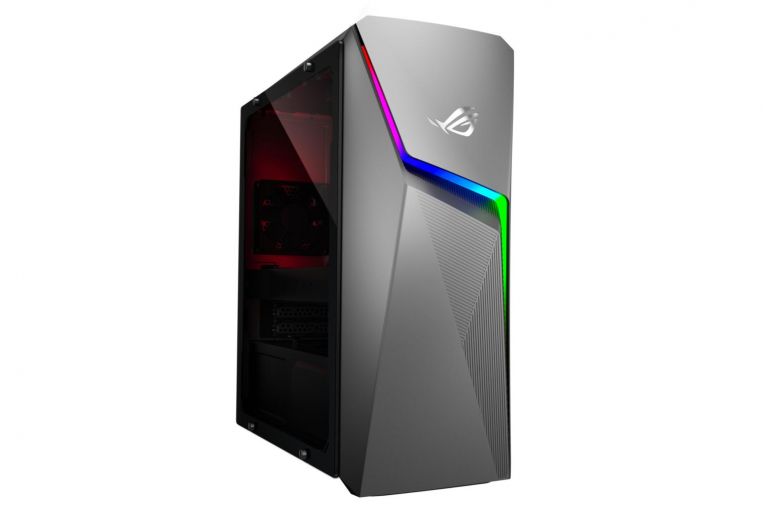Gaming laptops may have become more portable and powerful over the years, but desktop gaming PCs are still the ones to beat when it comes to performance and value.
Take the Asus ROG Strix GL10CS gaming desktop. My review set, which is packed to the gills with high-end components such as an eight-core Intel Core i7 processor, 32GB of system memory and an Nvidia GeForce RTX 2070 graphics card, costs $3,298.
It all translates to a score of 8,376 in the 3DMark gaming benchmark (Time Spy) and around 157 frames per second (fps) in the first-person shooter game Doom at Ultra setting.
In comparison, a high-end gaming laptop like the Lenovo Legion Y740 with a six-core Intel Core i7 processor and an Nvidia GeForce RTX 2080 (Max-Q variant) graphics chip is priced at $4,499. This notebook managed only 7,107 in the 3DMark test and 113fps in Doom.
Of course, this is not an apples to apples comparison. I did not factor in the cost of a monitor for the ROG Strix GL10CS, though Asus did bundle a keyboard and mouse with its desktop PC. Gaming laptops are also portable, unlike the GL10CS, which comes in a conventional tower chassis weighing around 8kg. But there is little doubt that you get more bang for your dollar in terms of performance with a gaming desktop PC over a laptop.
Included with the Asus is a transparent side panel that lets users admire the computer’s LED-illuminated internals. Given its gaming audience, this see-through side panel should probably have been installed by default.
The internal LEDs, as well as the curved LED strip running across the desktop’s front facade, can be customised using the preloaded Asus Armoury Crate app. On top of that, you can synchronise the behaviour of these LEDs across a range of compatible Asus gaming accessories and products via the Aura Sync feature.
Overall, the Armoury Crate is a useful utility that can automate tasks such as turning off the Windows key when a game is started, as well as adjust the speed of the cooling fans. At its maximum speed, these fans can spin at around 4,500 revolutions per minute (rpm), which is dreadfully loud. But during my tests, they stayed mostly quiet.
Asus also offers a similar smartphone app that can connect to the computer to monitor the PC’s status and adjust its settings. But I found this app rather buggy.
One minor complaint – the Asus is equipped with a 500W power supply unit (PSU). While sufficient for its current hardware, this PSU will probably not be enough if users decide to switch to more power-hungry components in the future. For instance, a 650W PSU is recommended for the flagship GeForce RTX 2080 graphics card.
I also found the lack of USB Type-C ports to be rather puzzling. The only USB-C port in the Asus is the one provided by the Nvidia graphics card – intended for connecting virtual reality headsets but works with most USB-C devices.
While my review set is targeted at the premium segment, the GL10CS is available from $1,298 with a mid-range Intel Core i5 chip and an entry-level Nvidia GeForce GTX 1050 graphics chip. In my experience, this configuration is fast enough for popular e-sports titles like League of Legends and Overwatch, at a typical 1080p resolution.
Asus offers a total of five different hardware configurations for the GL10CS, so you can easily find one for your requirements and budget. My review set is the most expensive of the lot and is suitable for gamers who desire the best performance and visuals, as its RTX 2070 graphics card supports more realistic-looking graphics through its support for ray-tracing.
FOR
Good range of hardware configurations
Transparent side panel shows off internal lighting system to good effect
Three-year on-site warranty
AGAINST
Tower design not compact enough
500W power supply may be inadequate for future upgrades
Could do with more USB-C ports
SPECS
Price: $3,298
Processor: Intel Core i7-9700K (3.6GHz)
Graphics: Nvidia GeForce RTX 2070 8GB GDDR6
RAM: 32GB DDR4
Storage: 512GB SSD + 2TB 7,200rpm HDD
Front ports: 2 x USB 3.1 Gen 1 Type-A, microphone input, headphone output
Rear ports: 2 x USB 3.1 Gen 1 Type-A, 2 x USB 2.0, HDMI, audio jacks, Ethernet port
Display outputs: 2 x DisplayPort, HDMI, USB Type-C
RATING
Features: 4/5
Design: 3.5/5
Performance: 4.5/5
Value for money: 4/5
Overall: 4/5
Source: Read Full Article
